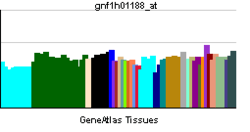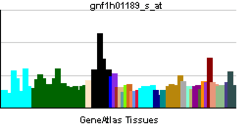BTBD14B
| NACC1 | |||||||||||||||
|---|---|---|---|---|---|---|---|---|---|---|---|---|---|---|---|
| |||||||||||||||
| Identifiers | |||||||||||||||
| Aliases | NACC1, BEND8, BTBD14B, BTBD30, NAC-1, NAC1, nucleus accumbens associated 1 | ||||||||||||||
| External IDs | MGI: 1914080 HomoloGene: 12042 GeneCards: NACC1 | ||||||||||||||
| Genetically Related Diseases | |||||||||||||||
| obesity[1] | |||||||||||||||
| RNA expression pattern | |||||||||||||||
  | |||||||||||||||
| More reference expression data | |||||||||||||||
| Orthologs | |||||||||||||||
| Species | Human | Mouse | |||||||||||||
| Entrez | |||||||||||||||
| Ensembl | |||||||||||||||
| UniProt | |||||||||||||||
| RefSeq (mRNA) | |||||||||||||||
| RefSeq (protein) | |||||||||||||||
| Location (UCSC) | Chr 19: 13.12 – 13.14 Mb | Chr 8: 84.67 – 84.69 Mb | |||||||||||||
| PubMed search | [2] | [3] | |||||||||||||
| Wikidata | |||||||||||||||
| View/Edit Human | View/Edit Mouse |
Nucleus accumbens-associated protein 1 is a protein that in humans is encoded by the NACC1 gene.[4][5]
References
- ↑ "Diseases that are genetically associated with NACC1 view/edit references on wikidata".
- ↑ "Human PubMed Reference:".
- ↑ "Mouse PubMed Reference:".
- ↑ Strausberg RL, Feingold EA, Grouse LH, et al. (Dec 2002). "Generation and initial analysis of more than 15,000 full-length human and mouse cDNA sequences". Proc Natl Acad Sci U S A. 99 (26): 16899–903. doi:10.1073/pnas.242603899. PMC 139241
 . PMID 12477932.
. PMID 12477932. - ↑ "Entrez Gene: BTBD14B BTB (POZ) domain containing 14B".
l
Further reading
- Nakayama K, Nakayama N, Wang TL, Shih IeM (2007). "NAC-1 controls cell growth and survival by repressing transcription of Gadd45GIP1, a candidate tumor suppressor". Cancer Res. 67 (17): 8058–64. doi:10.1158/0008-5472.CAN-07-1357. PMID 17804717.
- Davidson B, Berner A, Trope' CG, et al. (2007). "Expression and clinical role of the bric-a-brac tramtrack broad complex/poxvirus and zinc protein NAC-1 in ovarian carcinoma effusions". Hum. Pathol. 38 (7): 1030–6. doi:10.1016/j.humpath.2006.12.009. PMID 17391728.
- Nakayama K, Nakayama N, Davidson B, et al. (2007). "A BTB/POZ protein, NAC-1, is related to tumor recurrence and is essential for tumor growth and survival". Proc. Natl. Acad. Sci. U.S.A. 103 (49): 18739–44. doi:10.1073/pnas.0604083103. PMC 1693732
 . PMID 17130457.
. PMID 17130457. - Korutla L, Wang PJ, Mackler SA (2005). "The POZ/BTB protein NAC1 interacts with two different histone deacetylases in neuronal-like cultures". J. Neurochem. 94 (3): 786–93. doi:10.1111/j.1471-4159.2005.03206.x. PMID 16033423.
- Gerhard DS, Wagner L, Feingold EA, et al. (2004). "The Status, Quality, and Expansion of the NIH Full-Length cDNA Project: The Mammalian Gene Collection (MGC)". Genome Res. 14 (10B): 2121–7. doi:10.1101/gr.2596504. PMC 528928
 . PMID 15489334.
. PMID 15489334. - Beausoleil SA, Jedrychowski M, Schwartz D, et al. (2004). "Large-scale characterization of HeLa cell nuclear phosphoproteins". Proc. Natl. Acad. Sci. U.S.A. 101 (33): 12130–5. doi:10.1073/pnas.0404720101. PMC 514446
 . PMID 15302935.
. PMID 15302935. - Ota T, Suzuki Y, Nishikawa T, et al. (2004). "Complete sequencing and characterization of 21,243 full-length human cDNAs". Nat. Genet. 36 (1): 40–5. doi:10.1038/ng1285. PMID 14702039.
- Korutla L, Wang PJ, Lewis DM, et al. (2002). "Differences in expression, actions and cocaine regulation of two isoforms for the brain transcriptional regulator NAC1". Neuroscience. 110 (3): 421–9. doi:10.1016/S0306-4522(01)00518-8. PMID 11906783.
This article is issued from Wikipedia - version of the 6/6/2016. The text is available under the Creative Commons Attribution/Share Alike but additional terms may apply for the media files.